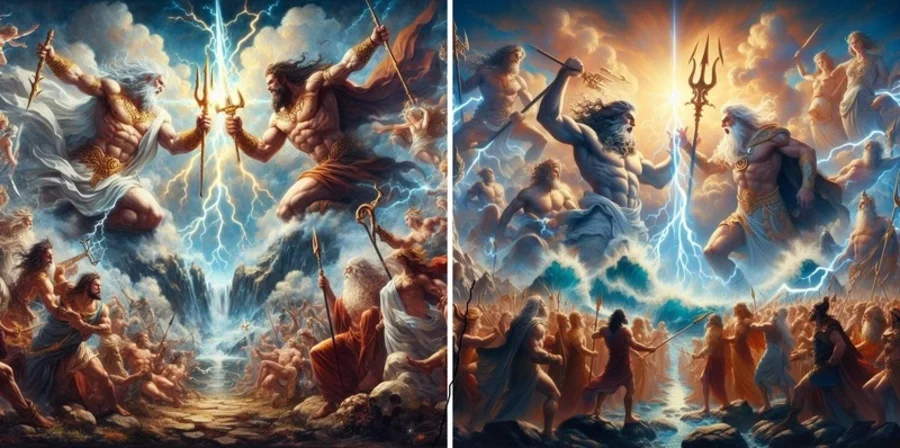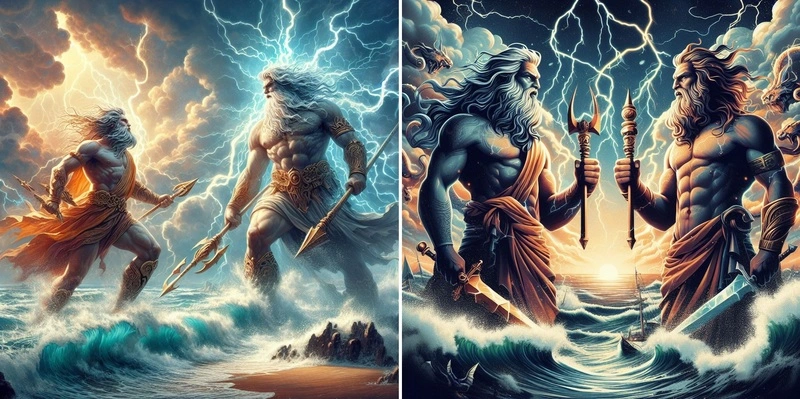
In the celestial hierarchy of Greek mythology, Zeus and Poseidon reign supreme over distinct realms of the cosmos. Zeus, the king of the gods, commands the skies and heavens, wielding thunderbolts with unparalleled mastery. Poseidon, on the other hand, rules the vast oceans, seas, and all aquatic realms, exerting dominion over the tempestuous forces beneath the waves.
The hypothetical battle between these mighty deities sparks intrigue, inviting speculation on the outcome of a mythic clash that transcends the boundaries of earthly and oceanic domains.
The clash between sky and sea forms the epic backdrop for this hypothetical confrontation. Zeus, armed with his mighty thunderbolts, symbolizes the raw power of the heavens. The ability to unleash lightning and storms encapsulates the potency of his divine authority, making him a formidable force capable of shaping the very elements.
Poseidon’s command over the oceans and seas grants him control over the primal forces of water. With a mere trident, he can stir tempests, conjure tidal waves, and shape the aquatic landscape. The vastness of Poseidon’s domain adds an element of unpredictability to the mythic encounter.
The hypothetical clash between Zeus and Poseidon extends beyond a mere battle of strength. It becomes a cosmic struggle, with each deity representing elemental forces crucial for the balance of the natural order. The outcome of such a clash could have profound repercussions for the very fabric of the mythic cosmos.
Zeus, as the king of the gods, is often portrayed as a strategic and tactical thinker. His experiences in leading the divine pantheon against the Titans showcase not just raw power but cunning intellect. The mythic battle would likely involve Zeus employing both his brawn and strategic prowess.
In contrast, Poseidon is associated with a more impulsive and tempestuous nature. His fury can be unleashed with devastating force, and the unpredictable nature of the sea mirrors the capricious temperament of this god. The battle might witness Poseidon’s unbridled power surging forth in waves of chaotic force.

Greek mythology offers instances where Zeus and Poseidon find themselves at odds. The contest for dominion over Athens is one such example, where Poseidon’s gift of a saltwater spring competes with Zeus’s olive tree. These mythic precedents hint at the tension between the gods, setting the stage for a larger clash.
In Greek mythology, the gods often call upon divine allies to aid them in times of need. The hypothetical battle between Zeus and Poseidon might involve alliances with other deities, adding an intricate layer of divine politics and strategy to the mythic confrontation.
Zeus vs Poseidon: Who would win?
The outcome of a mythical clash between Zeus and Poseidon would reverberate throughout the mortal realm. Mortals, caught in the crossfire of divine conflicts, would witness the consequences of such a monumental struggle, with the very forces of nature at stake.
The question of who would win in a battle between Zeus and Poseidon remains an unresolved tension within the tapestry of Greek mythology. It serves as a testament to the enduring allure of these mythical beings, whose clashes and collaborations shape the very foundations of the divine order.
The Myths of Zeus and Poseidon
- The Fall of Giants: When the monstrous Giants, children of Gaia, challenged the Olympian gods, Zeus and Poseidon led the charge against them. This myth emphasizes their ability to put aside rivalry for the greater good, their combined power proving unstoppable against this formidable foe.
- Favoring Heroes: Throughout their reign, Zeus and Poseidon often took interest in mortal affairs. In the Trojan War, Poseidon sided with Troy due to a grudge against King Laomedon, while Zeus initially favored the Greeks. This myth showcases how their rivalry could play out on the human stage, influencing the fates of heroes and kingdoms.
- The Contest for Athens: Both Zeus and Poseidon desired patronage of the newly formed city of Athens. They agreed to offer the city a gift, and the Athenians would choose their patron. Poseidon struck the ground with his trident, creating a magnificent wellspring. However, the water was salty, rendering it useless. Zeus, in contrast, presented an olive tree, a symbol of peace and prosperity. The Athenians chose Zeus, solidifying their rivalry over specific regions.
- The Minotaur: When Poseidon cursed King Minos of Crete with a monstrous offspring, the Minotaur, Zeus did not intervene. This myth portrays a dynamic where Zeus may prioritize maintaining order on Olympus over directly meddling in mortal affairs, even when Poseidon’s actions have devastating consequences.
- Alliances and Diplomacy: Despite occasional tensions, Zeus and Poseidon frequently collaborated with each other and other Olympian gods to maintain order and balance in the cosmos. Their alliances and diplomatic efforts were pivotal in shaping the mythological landscape of ancient Greece.